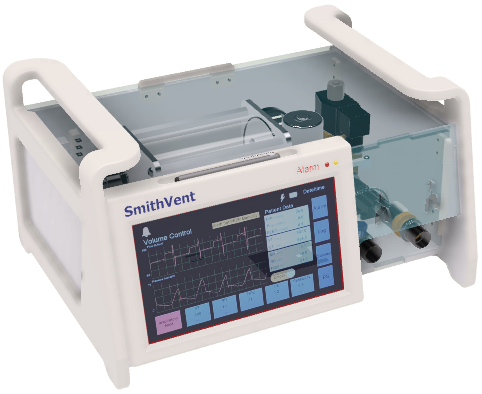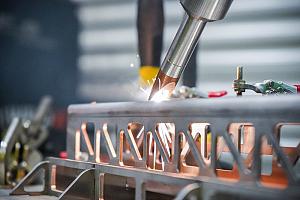- FMA
- The Fabricator
- FABTECH
- Canadian Metalworking
Our Publications
Categories
- Additive Manufacturing
- Aluminum Welding
- Arc Welding
- Assembly and Joining
- Automation and Robotics
- Bending and Forming
- Consumables
- Cutting and Weld Prep
- Electric Vehicles
- En Español
- Finishing
- Hydroforming
- Laser Cutting
- Laser Welding
- Machining
- Manufacturing Software
- Materials Handling
- Metals/Materials
- Oxyfuel Cutting
- Plasma Cutting
- Power Tools
- Punching and Other Holemaking
- Roll Forming
- Safety
- Sawing
- Shearing
- Shop Management
- Testing and Measuring
- Tube and Pipe Fabrication
- Tube and Pipe Production
- Waterjet Cutting
Industry Directory
Webcasts
Podcasts
FAB 40
Advertise
Subscribe
Account Login
Search
Winner of ventilator design/prototype contest announced
More than 200 ventilator designs were judged in global challenge
- July 3, 2020
- Article
- Additive Manufacturing

The Smith College team’s ventilator was chosen winner of the CoVent-19 Challenge from among 213 entries.
A dozen anesthesiologists at Massachusetts General Hospital kicked off a public challenge April 1 to design a rapidly deployable, low-cost ventilator that could address shortages caused by the COVID-19 pandemic, particularly in developing countries. Three months later a team of engineering alumnae, staff, and faculty from Smith College had taken a winning design from concept through working prototype.
The next step could be a final product for regulatory approval in Nigeria, just one of the countries that have been talking with the CoVent-19 Challenge organizers.
More than 200 designs were submitted; the seven finalists were chosen May 5. The host sponsors are Stratasys and medical device designer Ximedica.
The 30-person Smith College team collaborated on a simplified, cost-effective, easily manufactured pneumatic design specifically tailored to COVID-19 patient needs. The SmithVent design, which costs 1/10th the price of a traditional ventilator, combines economical proportional-solenoid-valve technology with an air-oxygen mixing chamber to meet the full set of requirements for COVID-19 ventilation.
The team primarily used readily available, off-the-shelf components, which reduced custom machining and improved compatibility with other medical equipment. The enclosure, ISO fittings, and mounting blocks can be produced using FFF- or stereolithography-style 3D printers. The design is open source, allowing anyone to download, use, and improve the design.
Smith College Engineering Professor Susannah Howe said the timeline was intense. “To a person, we came into this not knowing anything about ventilators,” she said. “In two months, we went from knowing nothing to having a functional prototype. That’s just crazy.”
Two other teams were also recognized by the CoVent-19 Challenge judges. The second-place design, InVent, was submitted by a team comprised of Fuse Project, a design and innovation firm founded by Swiss designer Yves Behar, and Cionic, a medical device technology start-up. The InVent prototype is a pneumatically driven ventilator optimized for a COVID-19 healthcare context that can be assembled in under four hours.
The third-place prototype, RespiraWorks, was developed by a global team of dozens of engineers, healthcare workers, and other professionals that bring a focus on developing countries and low-resource communities. The model uses a sophisticated blower-based ventilation system, simplified assembly and manufacturing, and high-quality, open-source software. Parts are designed to be available from local supply chains around the world.
Mass General anesthesiologist Dr. Richard Boyer, founder and codirector of the CoVent-19 Challenge, said when the group began planning the challenge in March, it was unclear if there would be enough ventilators even in the United States to treat pandemic patients.
“Our focus has since shifted to developing countries, where we’re seeing high death rates and limited resources to deal with the ravages of this new disease,” he said. “The test bed we developed gives us a lot of confidence in the performance of the winning prototype, and frankly there is probably tremendous value in getting other finalist designs out into the world too.”
READ THE FULL STORY
About the Publication
- Podcasting
- Podcast:
- The Fabricator Podcast
- Published:
- 04/30/2024
- Running Time:
- 53:00
Seth Feldman of Iowa-based Wertzbaugher Services joins The Fabricator Podcast to offer his take as a Gen Zer...
- Trending Articles
- Industry Events
Pipe and Tube Conference
- May 21 - 22, 2024
- Omaha, NE
World-Class Roll Forming Workshop
- June 5 - 6, 2024
- Louisville, KY
Advanced Laser Application Workshop
- June 25 - 27, 2024
- Novi, MI
Precision Press Brake Certificate Course
- July 31 - August 1, 2024
- Elgin,


























